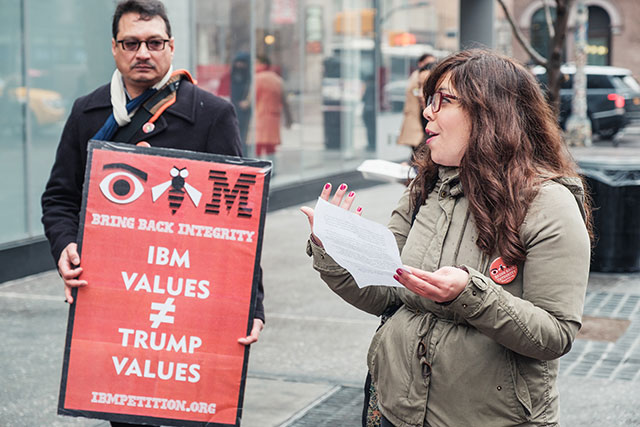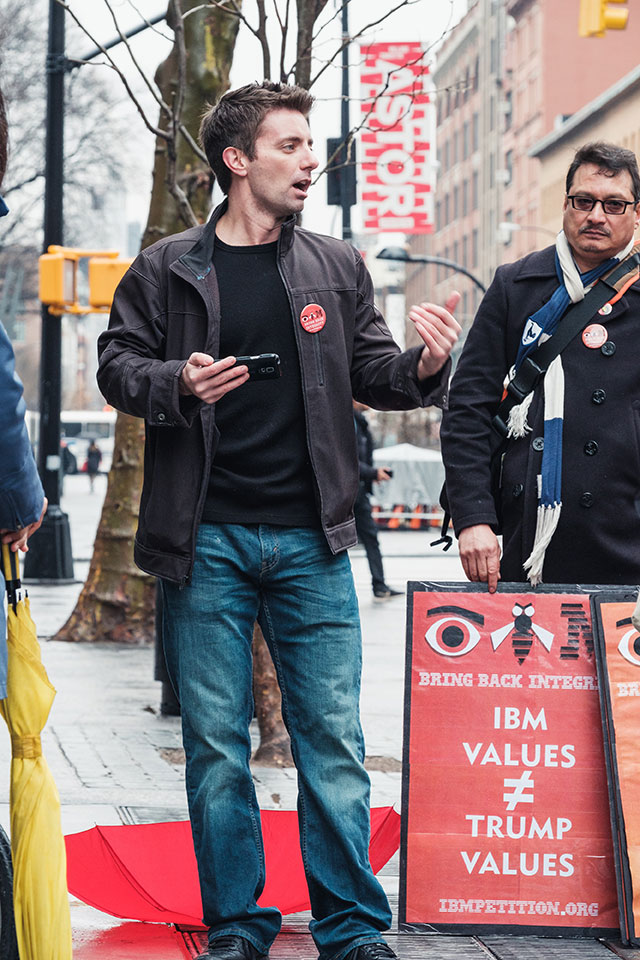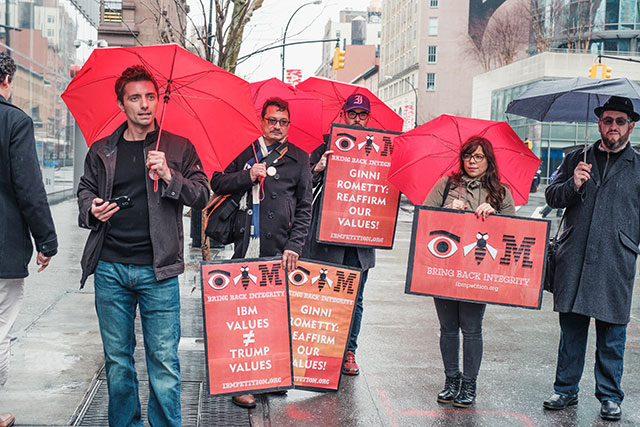
Since election night 2016, the streets of the US have rung with resistance. People all over the country have woken up with the conviction that they must do something to fight inequality in all its forms. But many are wondering what it is they can do. In this ongoing “Interviews for Resistance” series, experienced organizers, troublemakers and thinkers share their insights on what works, what doesn’t, what has changed and what is still the same. Today’s interview is the 28th in the series. Click here for the most recent interview before this one.
The tech industry likes to maintain a progressive reputation even when its policies increase inequality across the country. Yet after Donald Trump’s election, tech executives lined up to express willingness to work with Trump’s administration. For tech employees, this disconnect between the values that the companies preach in public and the values expressed by Trump has led them to begin organizing in their workplaces, demanding that their employers not collaborate with the president and using this moment as an opportunity to push the companies to live up to their stated values of diversity and inclusion. I spoke with workers at IBM who have begun just such a campaign.
First I spoke with Daniel Hanley, who is an IBM staff software engineer with the IBM Security division. He is also one of the organizers with the IBM petition campaign to reaffirm IBM’s values.
Sarah Jaffe: Let’s go back to the beginning and talk about how this campaign got started at IBM.
Daniel Hanley: I would say it was prompted by [IBM CEO] Ginni Rometty’s letter to Donald Trump on November 16. As you may know, shortly after Donald Trump was elected, Ginni Rometty penned a public letter to Donald Trump. She said many things in it, but among them, she praised his plans for corporate tax breaks and congratulated him on his election. Then, she pledged to collaborate on certain areas. These areas included government infrastructure and security, which concerned many people, particularly when you consider what Donald Trump considers security.
This sparked a lot of outrage on the internal IBM blog. IBM, to its credit, asked people to provide some feedback and provide it in a forum for discussion below Ginni Rometty’s letter internally. The response was quite incredible. I have been working at IBM for over 10 years. I haven’t seen anything like this. People spoke up. They were expressing a range of negative emotions, largely. Most comments on the blog were expressing disappointment, “Ginni, what about our values? What about diversity, inclusion, respect? Donald Trump represents the opposite of all of these values to us. At least you could have clarified the extent to our participation in the Trump administration.”
Other people were more scathing in their criticism. They said, “If we look at IBM’s history, IBM dealt with Nazi Germany to sell products and services that identified Jews during the holocaust for extermination. IBM dealt with the apartheid regime in South Africa. So, now, after reading this letter, we are a little worried. We are concerned that IBM might do it all over again if they could make some profit and get away with it.” These were the kinds of comments and things that people were saying.
Among other things, people reference Trump’s business dealings and now that Trump is president, obviously, according to our business conduct guidelines at IBM, we can’t do any deals with Trump businesses. Some people are calling for a clarification on that…. IBM didn’t give any kind of adequate response to all of these concerns that people addressed. I think we tallied dissenters in the hundreds on the internal blog. I was quite moved seeing so many of my colleagues express these values, standing up for them, even against the company’s chief executive. That was one of my proudest moments working at IBM, seeing that.
That is what prompted the campaign. Once we were ignored individually, many of us got together and decided, “Well, we need to organize this into a collective voice that can’t be ignored by IBM executives.” We used the Coworker.org platform to draft a petition. It was put together by a team of IBM-ers from different perspectives, different parts of the company. We came together; we got feedback from about 50 IBM-ers who eventually signed on to the petition. At that point, we went public with it. It got an incredible response after that.
 Former IBMer Elizabeth Wood, who resigned from the company with a statement of moral integrity over personal gain, at the New York petition delivery event. (Photo: Coworker.org)
Former IBMer Elizabeth Wood, who resigned from the company with a statement of moral integrity over personal gain, at the New York petition delivery event. (Photo: Coworker.org)
Tell us about the organizing process there and how that has grown since the petition went public. You have gotten quite a lot of signatures from IBM workers.
Yes, the organizing process is quite challenging, as it is for tech workers everywhere, I think. In many of these workplaces, it is a very geographically distributed environment. People might not have the same kind of rapport with a lot of their colleagues. A lot of people aren’t in the office. So, there are challenges. But, with the core group that we had signing on, and also the media attention it got from The Intercept and social media, as well, we were able to reach out to more and more.
We reached out to 500 people or so that had expressed dissent on Ginni Rometty’s letter. We found it on Facebook and LinkedIn and various other platforms where people working at IBM had criticized this letter. The response rate we got was quite impressive. A lot of people wound up signing the petition. Then, among the people who signed the petition, we tried to recruit a core organizing team in various IBM office locations. Throughout the country there were key point people who were down to post fliers, make phone calls to follow up with all the people on our list. We had some great conversations. We would ask people, “Hey, do you want to get involved to try to grow this campaign? Are you willing to post a flier in your workplace? Are you willing to share these articles on social media?” We got a good response on that, as well.
We have got weekly conference calls with about two dozen people around the country that participate. The petition campaign isn’t just a list of names below a document. We are trying to form the basis of an organization that can hold IBM accountable to our values. That is the organizing structure behind it.
 Daniel Hanley speaks at a New York petition delivery event. (Photo: Coworker.org) What the petition is calling for is, one, we want IBM to respect our right to refuse any participation in any illegal Trump project that violates the civil liberties of immigrants, Muslims, women, the LGBT community, marginalized groups in general. That is the first demand.
Daniel Hanley speaks at a New York petition delivery event. (Photo: Coworker.org) What the petition is calling for is, one, we want IBM to respect our right to refuse any participation in any illegal Trump project that violates the civil liberties of immigrants, Muslims, women, the LGBT community, marginalized groups in general. That is the first demand.
The second is we want IBM not just to talk about diversity and inclusion but take some concrete steps in response to Trump’s election to show that we value diversity and inclusion by expanding the diversity recruitment program.
Three, we want IBM to clearly sever all ties with Trump-related business entities. We don’t want the next IBM InterConnect 2018 conference to be held at a Trump hotel. Strangely, I researched on IBM’s internal website for employee discounts and we are being offered a discount at a Trump hotel in Miami. We think a clarification on the business conduct guidelines is in order.
Then, lastly, since so many IBM-ers are feeling upset, threatened by the Trump administration right now and we are living in precarious times, we want meaningful security in the form of restoration of benefits that have been recently cut. IBM cut the severance pay by 80 percent. The 401(k) policy uses an accounting trick that denies people who are laid off equal contribution — basically, they wait until the end of the year to make any contribution to the 401(k), which is affecting people right now, especially older IBM-ers that are impacted by this age-discrimination campaign that is in process. IBM is requiring long-term workers to … uproot and move, even though their kids might be in school, they may have a partner that has a job. They are being asked to turn their life upside down or they lose their job, no questions asked, no severance.
Yes, we want IBM to reaffirm all of its values: diversity, inclusion, respect for the individual — a core IBM value. And also, ethical business conduct.
One of the things I wanted to ask was how this connects up with the internal working conditions at IBM. That when we are talking about the company’s values, mostly we see those values expressed in how the workers are treated.
All these demands are related to workplace issues. We don’t want to be legal and liable for harming our own communities with any Trump project the way Palantir is being asked to do right now and the way IBM has harmed these communities in the past, as I mentioned before. Our argument is, implicitly, the way we are waging this campaign is that these empty, hollow corporate statements never adequately embody our values. It is the people who do the work at IBM, the people who innovate. We express our values, because corporate statements are always going to be motivated, at the end of the day, by the pursuit of profit, the pursuit of these lucrative Trump government contracts.
A friend of mine who is a reporter based in the Bay Area was talking about looking up the political contributions from tech industry employees and then tech industry leadership or tech industry political action communities, and analysing the difference between the values of young workers in these industries and the people at the head of their companies … there is often quite a gap there. Are we seeing the tech workforce step out from under the shadow of its bosses and really take a political stand?
I think it is important to understand our campaign in the broader context of the tech industry. There were people who were there at the speak-out in Atlanta on Monday. There is a video online at IBMPetition.org. The largest group present were IBM-ers speaking out, but we were joined by community supporters, some of whom were involved in the local tech solidarity meet-ups. We are seeing these tech solidarity groups pop up all over the country. There is a big Tech Stands Up group, there is the Tech Workers Coalition. What is really exciting for us is that our own campaign has inspired a sister campaign over at Oracle calling on its own CEO to join the amicus brief in opposition to the Muslim ban. This is definitely not just happening in a vacuum, but we are seeing tech consciousness arising here.
I want to go back to something else you said about the younger millennial type workers. These are people who were appalled by Trump’s racism and xenophobia and Islamophobia. What I learned from internal sources involved in HR and involved in recruitment from the open source community, they are saying that now their jobs are much more difficult because of Ginni Rometty’s proximity to Trump and her refusal to give a clarification on the relationship or strong opposition to any project that violates civil liberties. The younger potential recruits are feeling alienated. The older long-term IBM-ers are also feeling very upset and worried about their futures because of the severance cuts and all of the other issues I raised before…. I think the IBM Petition campaign will hopefully move Ginni Rometty to address both of these problems in a positive way.
But you have not heard anything from her or from the higher ups so far, correct?
No, we haven’t heard any adequate response to our demands. Since this campaign started, we feel like our campaign may have influenced her. She did write a statement about the Muslim ban, but I would not call this an adequate response. Many members of our campaign were very critical of it. It did not, to my knowledge, pacify anybody. There were a couple of differences. For one thing, until this was leaked maybe deliberately to TechCrunch, this was an internal letter. It wasn’t written as a public letter like her letter to Trump. That is one thing.
Portraying the Muslim ban as a security measure is not factual. It is an Islamophobic measure.
Another thing is, that forum I referenced earlier where people could discuss and debate the issues, it was shut down. There was no comment section this time. We think that was deliberate, as well. The thing that struck me the most though was the content of this letter. For one thing, it portrayed this struggle around the debate as a struggle between openness and security. Those are the words she said. “It is about openness versus security.” I think that is very harmful. Portraying the Muslim ban as a security measure is not factual. It is misleading. Federal court observed that there is no security justification for it. Calling it a security measure is wrong. It is an Islamophobic measure. It is a discriminatory measure.
Well, there are many ways we can go on that. Obviously, as you said, these tech companies — among many other corporations that like to portray themselves as bastions of diversity — they do tend to have a fairly diverse workforce on some levels. Not so much on others. I think it is interesting that in this context one of the demands here is to do some actual work on the diversity in the tech workforce.
IBM is a very big and powerful institution in the United States and it employs hundreds of thousands of workers worldwide. I am not sure exactly how many, but I have heard a third are in the United States right now. So, as this powerful institution we have a role in these kind of institutional challenges around diversity versus racism and Islamophobia and xenophobia. I think this campaign can advance IBM in responsibly using its power to advance these values. Whether that is in terms of the projects that we take on or the statements we make as a company or the policies in terms of recruitment and diversity. Many groups of people are under-represented in my workplace.
I should note that I live in Atlanta. This is a very diverse city. I would expect people of color to be more greatly represented in our workplace. Unfortunately, that is not the case.
Anything else that people should know about this campaign?
It is very heartening to see other tech workers take action elsewhere. We think our organizing model is sound and has some proven results. We strongly support things like the Never Again Pledge, an alliance of workers among many companies making a broad statement of principles that never again are we going to use our role in these companies to sell technologies like the punch card machines to the Nazis. That broad statement of principles is very, very powerful, but, at the end of the day, in our own workplaces we have leverage to submit policy changes like those that IBMPetition.org has proposed to their company’s executives. We think this is a successful model. I feel very validated when people at Oracle and elsewhere adopt it, as well.
***
Next I spoke with S.B., another long-time IBM worker and organizer on the campaign who was part of the petition delivery team and who currently works as an IT Consultant in Boston. S.B. is originally from Singapore and has been at IBM for 16 years.
Sarah Jaffe: How did you get involved with the campaign and the petition to IBM’s CEO about working with Trump?
S.B.: Like a lot of people, I read Ginni’s open letter to Trump and was basically appalled that the CEO of the company that I work for should be pledging to work with someone like Donald Trump, whose values I don’t think match my own or I believe the company I work for, IBM. What particularly got me was that it was completely unconditional and included things like approving tax cuts for corporations, which just seems totally crazy to me.
 Daniel Hanley, S.B. and colleagues deliver petitions to IBM headquarters in New York, March 28, 2017. (Photo: Coworker.org)
Daniel Hanley, S.B. and colleagues deliver petitions to IBM headquarters in New York, March 28, 2017. (Photo: Coworker.org)
When you started working on the campaign, can you tell me about what it was like getting involved, talking to coworkers?
Daniel, before going public with the petition, he emailed a couple of people expressing objections to Ginni’s open letter. I signed the petition and Daniel asked if I would like to get involved with contacting people, getting people to sign the petition, and see where we could take it. I gladly did that. It was something I thought was important to do, to start talking about these things within the company. It is a culture in a lot of workplaces, I don’t think it is just in tech companies, but in a lot of companies you just don’t talk about politics.
This was clearly, to me, it was something completely political what Ginni had done, writing a letter to then President-Elect Trump, which I found objectionable on moral and general grounds of values. One of the things that struck me when I read the letter, I couldn’t believe it because I felt that Donald Trump — if I had done some of those things that he has done, I would lose my job. If I advocated for sexually assaulting women, I would lose my job. It is not the kind of customer or value we want to be associated with.
I decided to get involved and Daniel put together a list of people who had signed the petition and started making calls and talking to people. These were people that signed the petition, so obviously they were sympathetic, but many of them either were not prepared to devote any time to organizing around it. I totally understand that. But, there was a lot of support, too. A lot of people expressed how grateful they were. When Daniel reached out to me, I felt a sense of optimism that something was happening, at least. That there was going to be a place where we could talk about it and bring our concerns and shared values into the light.
You were involved in the petition delivery, correct?
Yes. There were two petition events, one in Atlanta and one in New York. I was at the one in New York at the Watson headquarters in downtown Manhattan. Daniel and I did some fliering outside the office in the morning. Unfortunately, it was a wet and cold day, so there wasn’t the turnout that we might have liked, but people stopped and listened. I thought it was great. I think people were aware of what was happening and we were making a definite statement.
You have been at IBM for quite a long time now. As you were saying, you don’t usually talk about politics at work, but is this the first time you have been involved with something like this?
Yes, it is the first time I have been involved in something like this, something directly that I am connected with. During the Bernie campaign I volunteered for him. I did some phone banking and I worked on his email help desk. But this is the first action that I have taken part in.
I know that many of the workers who have signed onto this are people from communities that are directly targeted by Trump. As somebody who is an immigrant yourself, tell me how that plays into this.
When Trump released … the Muslim ban and IBM’s response was corporate gibberish, it just felt like that was something very obvious that IBM could have stood up and spoken up against … IBM cannot protect its own workers if it doesn’t also stand up for everyone who is affected by it. I was really disappointed by that.
To me, it feels like tech workers have in the past been very privileged in a way. They have comparatively well-paid jobs and more security than other areas, but I think even tech workers now are really feeling the crunch of the economy and uncertainty about their own futures and livelihoods. I know I, myself, am in my late fifties and I have been at IBM for a long time. Over that time, I have started to be more and more insecure about my job and whether the company really has my interests in mind at all in whatever they do. My sense is that they don’t.
How can people keep up with the campaign?
You can go to IBMPetition.org and sign on as a supporter, but we also have a Facebook page. IBM is a big company. A lot of people I run into say, “My uncle works at IBM” or “My niece just got a job there.” If you know anybody working at IBM who supports these same values, please connect them with us. We are still trying to grow our organizing team. Like I said, even if tomorrow Ginni Rometty were to implement all of our proposals in our petition, we would still need an independent organization that can hold executives accountable to those values.
Interviews for Resistance is a project of Sarah Jaffe, with assistance from Laura Feuillebois and support from the Nation Institute. It is also available as a podcast on iTunes. Not to be reprinted without permission.
Press freedom is under attack
As Trump cracks down on political speech, independent media is increasingly necessary.
Truthout produces reporting you won’t see in the mainstream: journalism from the frontlines of global conflict, interviews with grassroots movement leaders, high-quality legal analysis and more.
Our work is possible thanks to reader support. Help Truthout catalyze change and social justice — make a tax-deductible monthly or one-time donation today.